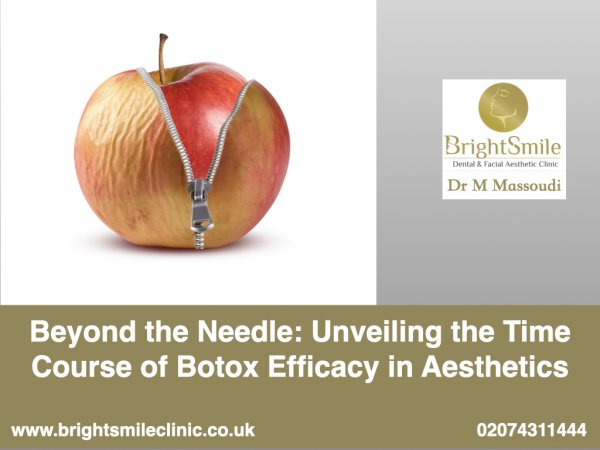
Latest Bright Smile News
Beyond the Needle: Unveiling the Time Course of Botox Efficacy in Aesthetics
Sunday 3rd December 2023
|
The reason why Botox wears off is because it’s temporary. Botox blocks nerve signals to the muscles, causing temporary paralysis that reduces the appearance of wrinkles. Over time, the body breaks down the injected Botulinum toxin and eliminates it from the bloodstream. When the nerve signals return to normal, muscle activity resumes and wrinkles come back. How long does Botox last? Most Botox treatments last between three and four months. Results vary from person to person. Factors like metabolism, injection method, and muscle dynamics affect how long Botox lasts. If you’re looking for long-lasting aesthetic results from Botox, you’ll need to re-inject regularly. If you have any questions about these treatment then please get in touch with BrightSmile Dental & Aesthetic Clinic in London NW3. We will answer all of your questions and offer a bespoke treatment to you. For more information, book your consultation today here or call us on 02074311444
Tags: botox, filler, NW3, facial rejuvenation, botulinum toxin, NW6, hampstead, Juvederm, hyaluronic acid, Finchley Road, facial aesthetics, dermal filler, 8-point lift, liquid face lift, liquid facelift, non-surgical face lift, non-surgical facelift, facelift, aesthetic, facial revitalisation, facial revitalization, md codes, Mauricio de Maio, allergan, facial codes, NW8, Teoxane, Aesthetics, London, stylage, johns wood, harmonisation, harmonization, facial balance, facial harmonisation, facial harmonization, facial balancing, resistance Categories: Bright Smile Clinic News |
Posted by Bright Smile Clinic at 17:10
Botox Resistance: Unraveling the Factors Behind Diminished Results
Sunday 3rd September 2023
|
Antibody formation plays a critical role in the development of Botox resistance. Botox, derived from the bacterium Clostridium botulinum, is a neurotoxin used in cosmetic and medical procedures to temporarily paralyze muscles, reducing the appearance of wrinkles or treating various medical conditions. When Botox is repeatedly injected into a person's body, their immune system may recognize it as a foreign invader and produce antibodies to neutralize the toxin. These antibodies can bind to Botox molecules, preventing them from effectively blocking nerve signals to muscles. As a result, the muscle relaxation and wrinkle-smoothing effects become less pronounced or even non-existent, leading to diminished treatment outcomes. This phenomenon can vary among individuals; some may develop antibodies more rapidly than others, making Botox less effective over time. To address Botox resistance due to antibody formation, practitioners may adjust treatment plans, explore alternative neuromodulators, or use higher doses of Botox. It underscores the importance of working with experienced healthcare professionals who can tailor treatments to individual needs and monitor for changes in effectiveness over time. If you have any questions about these treatment then please get in touch with BrightSmile Dental & Aesthetic Clinic in London NW3. We will answer all of your questions and offer a bespoke treatment to you. For more information, book your consultation today here or call us on 02074311444
Tags: botox, filler, NW3, facial rejuvenation, botulinum toxin, NW6, hampstead, Juvederm, hyaluronic acid, Finchley Road, facial aesthetics, dermal filler, 8-point lift, liquid face lift, liquid facelift, non-surgical face lift, non-surgical facelift, facelift, aesthetic, facial revitalisation, facial revitalization, md codes, Mauricio de Maio, allergan, facial codes, NW8, Teoxane, Aesthetics, London, stylage, johns wood, harmonisation, harmonization, facial balance, facial harmonisation, facial harmonization, facial balancing, resistance Categories: Bright Smile Clinic News |
Posted by Bright Smile Clinic at 10:28




